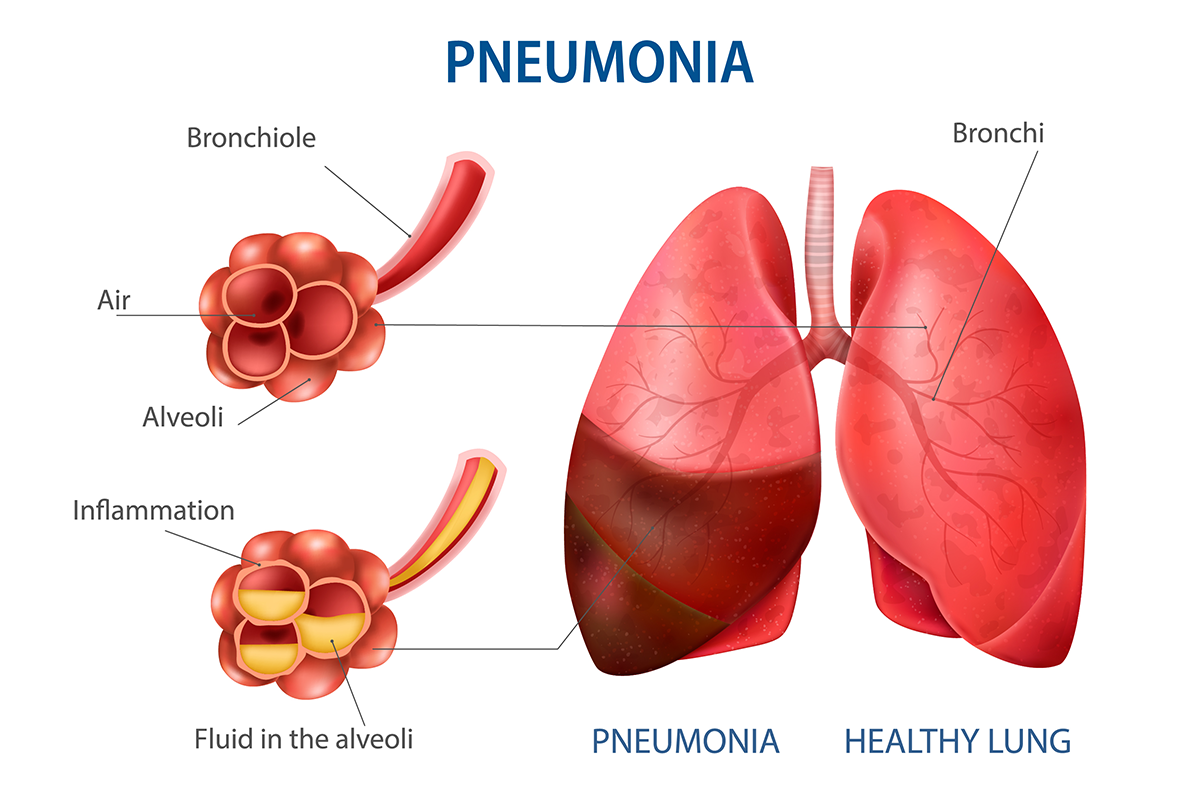 November 12, 2022
November 12, 2022
How to Win Against Pneumonia?
According to data shared by WHO (World Health Organisation), pneumonia was the primary cause of death in 740,180 children under the age of 5 in 2019.
During the late 1800s and early 1900s, pneumonia was considered one of the leading causes of death. But due to advancements in medical science today, it is a curable disease that can cause severe lung problems. Thus, it is important that we learn more about this disease so that we can prevent it from harming us.
What is pneumonia?
Pneumonia is a lung infection caused by various bacteria, viruses, or fungi, which can affect one or both lungs. It inflames the air sacs in the lungs with pus or fluid, causing difficulty breathing, cough with sputum, fever, and chills. Infants above 65 and those with weakened immune systems are more susceptible to pneumonia. Though treatable with modern medicine, it can range in seriousness from mild to life-threatening.
The main types of pneumonia include:
- Bacterial- Most commonly caused by the bacteria Streptococcus pneumoniae, it usually happens if your body is weakened in some way, such as poor nutrition, old age, etc. Mycoplasma pneumoniae is another common type of bacterial pneumonia referred to as atypical pneumonia as the symptoms are somewhat different.
- Viral- This is mostly caused by influenza (flu) and the SARS virus (COVID-19 Virus). Viral types of pneumonia can be fatal if not treated in time, given that sometimes they may get complicated by adding bacterial infection over the existing viral pneumonia.
- Fungi- mainly occur in people with weakened immune systems (by birth/due to chronic illnesses/HIV/ taking immuno-suppressant medicines). Pneumocystis jirovecii is a fungus that causes pneumonia in people infected with HIV/AIDS.
What are the symptoms of pneumonia?
The symptoms of pneumonia include:
- Chest pain when you breathe or cough
- Chills
- Cough with or without mucus
- Fever
- Low oxygen levels in your blood, measured with a pulse oximeter
- Shortness of breath
- Blueish color lips and fingernails
- Cough that produces green, yellow, or bloody mucus
- Heavy Sweating
- Loss of appetite
- Sharp or stabbing chest pain that gets worse with deep breathing or cough
Who are at risk of developing pneumonia?
- Age- Children under 2 years old and people 65 years old or older are at risk of developing pneumonia because of their weak immune systems.
- Chronic diseases- Having chronic diseases such as asthma or HIV/AIDS affects your immune system and increases your chances of getting pneumonia.
- Habits- Health-damaging habits such as smoking, alcohol, drugs, etc., can also damage your immune system, making you more susceptible to getting pneumonia.
How to treat pneumonia?
Using various tools and procedures it has become incredibly easier today to diagnose pneumonia. The tests to confirm the diagnosis include chest X-ray, blood tests, sputum testing, chest CT scan, bronchoscopy, etc.
The treatment plan for pneumonia depends on the type of pneumonia you have. Mild pneumonia may be treated at home with plenty of rest, fever control, and other medicines as prescribed by your doctor. Bacterial pneumonia is treated with antibiotics; anti-fungal may be needed for fungal pneumonia. People who belong to the high-risk group are hospitalized as they may develop serious complications such as:
- Respiratory failure- refers to a condition where a person cannot breathe independently and requires breathing machines and ventilators.
- Lung abscesses- A condition that causes pus to accumulate inside or around the lungs in the form of pockets. It may require to be drained out.
- Sepsis- When the infection enters the bloodstream, it may travel to other organs causing multi-organ infection or organ failure.
How can I prevent pneumonia?
Certain ways in which pneumonia can be prevented are:
- Getting Vaccinated- Vaccines are available for certain types of pneumonia, such as influenza (flu), Covid-19, etc. Children should get all their vaccines per their vaccination schedule to strengthen their immune systems.
- Practicing Good Hygiene- Practicing good hygiene, such as washing your hands frequently and covering your mouth while sneezing or coughing with a tissue or handkerchief and discarding or disinfecting them as soon as possible, are some ways in which we can try to lessen the chances of pneumonia occurring.
- Letting Go of Habits- Habits such as alcohol abuse, drugs, and smoking affect our body’s natural defense against infection. Letting go of these habits will surely increase our chances of combatting pneumonia.
If you experience any symptoms related to Pneumonia, do not delay consulting your doctor. Receiving the proper medical treatment and care is the only way to steer clear of any related medical complications. To book an appointment, contact us at +91-9540 114 114.
 November 12, 2022
November 12, 2022